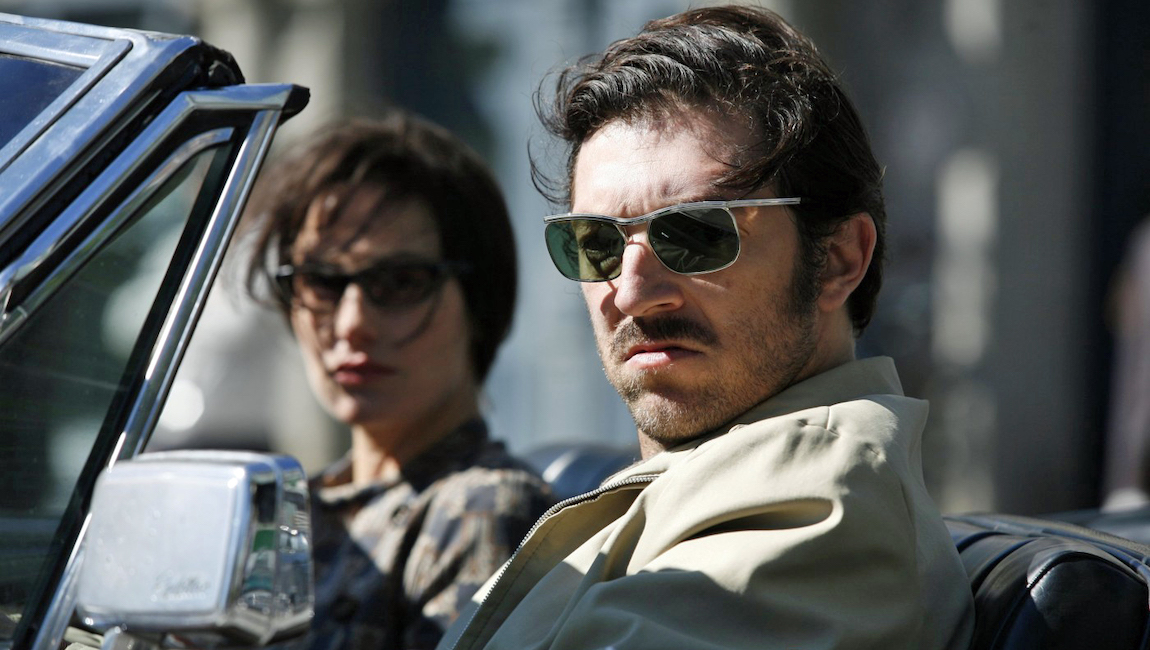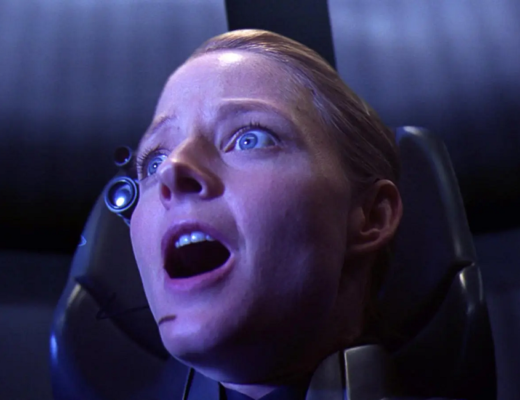In 1969, Jacques Mesrine (May-reen), French arch-criminal and would-be folk hero, was on the lam from both French and Canadian authorities. He fled to the U.S., where he was eventually and uneventfully arrested in Arkansas. So it’s telling that in Jean-Francois Richet’s four-hour-plus, two-part biopic, this incident becomes a high-speed chase through Monument Valley in a cherry red convertible. Mesrine: Killer Instinct and its companion Meserine: Public Enemy #1 are the result of an earnest but underdeveloped attempt to synthesize a new myth from Arthur Penn’s Bonnie & Clyde, Soderbergh’s Che, and the macho, detail-rich action films of Michael Mann. It ultimately succeeds, at best, on only that third front. Frankly, and though he stages his thrills with relish and competence, Richet lacks the formal chops of all three filmmakers, and his additional attempts at injecting a level of political dimension into the proceedings come off as mere lip-service. What Richet is left with, then, and what he handles admirably, are a slew of action scenes and a manic, showy lead performance from Vincent Cassel as the titular badass, a man whose exploits encompassed such extremes of criminal behavior that he was literally named France’s Public Enemy #1.
Cassel, who packed on a ton of weight for the role, plays Mesrine as a jocular, impulsive everyman; there is no childhood trauma, no search for parental approval to provide some emotional anchor or to mitigate bad behavior, and so the first film manages to track his transformation from petty thief to pure, violent force of nature almost matter-of-factly. Cassel is in nearly every scene, jangling about, bragging that he can steal or kill anything he damn well pleases, and often doing just that. Killer Instinct culminates in an incredible, suspenseful sequence wherein Cassel cuts through a series of fences during a broad-daylight jailbreak, followed by his return to the same prison weeks later with his buddies and an arsenal of weapons, busting out even more of his fellow inmates. (It would be completely ridiculous if it weren’t apparently true.) Between Cassel’s bug-eyed ferocity and Richet’s confident, competent direction, we’re served up an action scene that brings Mesrine (character and film) to bloody, hysterical life. Together with the aforementioned Monument Valley sequence, it’s as close to the goal of pulpy myth-making that the movie gets. If Richet had decided to stop there he’d have a tight thriller that harkened back to the best of ’70s Eurocrime and its copious sleaze and violence.
Part two, Public Enemy #1, noticeably switches gears, trying to convince that Mesrine was a legitimate folk hero who championed inmate’s rights and personified an egalitarian sentiment in direct contrast to the tide of crypto-communist terrorism that swept Europe in the ’70s. After his thrilling prison break, Mesrine teams up with Francois Besse (Mathieu Amalric), another thief and kidnapper who felt he was part of the red revolution. Mostly this union results in scenes of Cassel insisting on his status as a man of the people while Amalric watches coverage of the Aldo Moro kidnapping in Italy (an unfortunate tangent for this film to explore given the existence of Marco Bellocchio’s superb Vincere). Insisting that Mesrine matters as an ideologue is a serious miscalculation, but it’s interesting that what kills the film is also, arguably, what killed the man. Making no effort to justify or apologize for his crimes, Mesrine transforms into a sort of Tasmanian Devil of crime, devouring everything in his path. In this analogy, political legitimacy and folk-hero status are Mesrine’s Bugs Bunny in a dress: irresistible, but obviously a trap, one that ensnares the movie as well. It feels like an apology for making such a shameless love letter to such a terrible man, something Jacques Mesrine himself would probably find even more reprehensible than his crimes.







